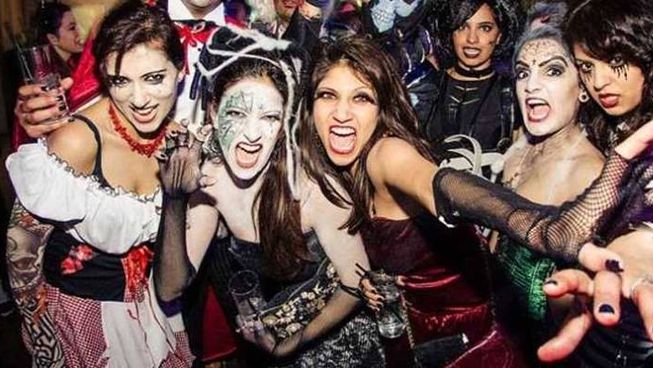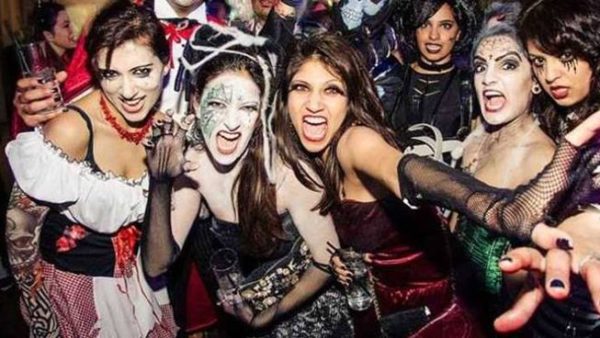
30 Oct Halloween Goes International
According to Brian Handwerk in Nat Geo, Halloween is no longer an American holiday. The spookfest is going global.

Halloween is spreading around the globe like a zombie outbreak.
From Germany to Japan, young adults are embracing the holiday—particularly its costume parties—as they escape the status quo for a night.
“It’s a day of festive license, transgression, and a certain lack of inhibition,” says Nicholas Rogers, a historian at York University in Toronto and the author of Halloween: From Pagan Ritual to Party Night.
“And, of course, social media really encourages this kind of thing.”
Rogers grew up in Bristol, England, where Halloween was once little noticed. But to the chagrin of some in the United Kingdom, it has grown immensely: Forty-six percent of U.K. consumers spent money on Halloween in 2016, shelling out a total of 310 million pounds—a number that’s expected to rise in 2017. (See pictures of England’s goth festival, which takes place every October.)
The U.K., like the U.S. and Canada, is home to many people descended from the Celts, an ancient people that celebrated Halloween’s predecessors.
GETTING GHOULISH IN GERMANY
But even in places without a Celtic connection, the sugary trappings of Halloween are taking hold. In Germany, for example, Halloween has grown dramatically in the past 25 years, particularly among young people.
This year, 18 percent of Germans are considering costumes, with about 37 percent of 18-to-29-year-olds planning to dress up, according to a recent YouGov survey.
“And, of course, social media really encourages this kind of thing.”
Rogers grew up in Bristol, England, where Halloween was once little noticed. But to the chagrin of some in the United Kingdom, it has grown immensely: Forty-six percent of U.K. consumers spent money on Halloween in 2016, shelling out a total of 310 million pounds—a number that’s expected to rise in 2017. (See pictures of England’s goth festival, which takes place every October.)
The U.K., like the U.S. and Canada, is home to many people descended from the Celts, an ancient people that celebrated Halloween’s predecessors.
But even in places without a Celtic connection, the sugary trappings of Halloween are taking hold. In Germany, for example, Halloween has grown dramatically in the past 25 years, particularly among young people.
This year, 18 percent of Germans are considering costumes, with about 37 percent of 18-to-29-year-olds planning to dress up, according to a recent YouGov survey.
Dieter Tschorn, a consultant for Novelty Retailers Association, told Der Spiegel in 2013 that he considers himself the “father of Halloween in Germany.”
When the 1991 Gulf War interrupted Carnival celebrations in Germany, Tschorn decided to help his clients recover lost revenue. Inspired by the annual U.S. military Halloween party held in Frankenstein’s Castle—now in its 40th year—Tschorn began to send out annual press releases touting Halloween as a new festival. This, in turn, inspired the growth of Halloween in the country.
HALLOWEEN, TOKYO-STYLE
On the other side of the world, the Japanese celebrate in their own style. Instead of trick-or-treating or decorating their homes, they often indulge in an alter-ego—a popular pastime in a nation where “costume play” was invented. (Dressing in horror or spooky themnes is less common in Japan.)
What began at Tokyo Disney Resort has now spilled into the streets. The annual Haraiuku-Omotesando Hello Halloween Pumpkin Parade draws thousands of costumed children, and crowds watching the Kawasaki Halloween Parade swell to well over 100,000, according to the BBC.
More adult mayhem is on offer in Shibuya, where the crush of costumed revelers has reached such size that police begun closing streets to traffic during the evenings on and around Halloween. (See pictures of spooky Halloween costumes of yesteryear.)
In 2015, the Associated Press reported that some 20 million Japanese would observe Halloween, and create between 170 and 250 million dollars in economic impact.
HALLOWEEN HATERS
Popular as it is, many people are vehemently against Halloween in their countries, whether it be religious objections or fears of cultural imperialism.
It may be a bit of both in Germany, where 48 percent of respondents in the 2017 YouGov survey said the spooky holiday is a U.S. import that displaces German culture. October 31 is Reformation Day in Germany, and commemorates the day when Martin Luther launched Europe’s Protestant Reformation.
“There is definitely a pushback, a resistance especially among older people to the idea of Halloween,” Rogers says.
“They see it as just one more example of American commercial penetration.”
In Britain, some households display “no trick or treat” signs like these created by the Devon and Cornwall Police.
There’s also concern in the country that Halloween is “taking over from Guy Fawkes Night, or Bonfire Night, on the fifth of November,” says Rogers. “That was a day I celebrated with fireworks, and you burnt an effigy on a bonfire…”


Sorry, the comment form is closed at this time.